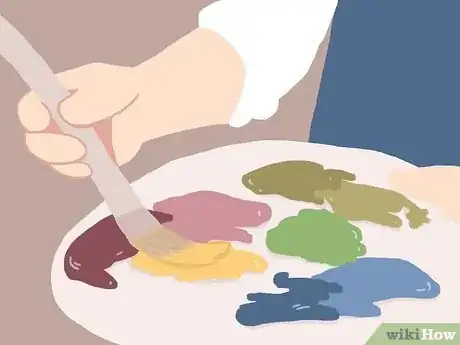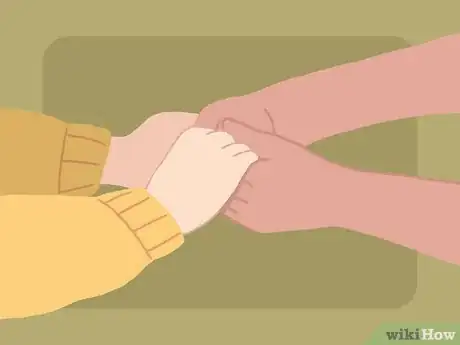This article was co-authored by Kelli Miller, LCSW, MSW and by wikiHow staff writer, Amy Bobinger. Kelli Miller is a Psychotherapist based in Los Angeles, California. Kelli specializes in individual and couples therapy focusing on relationships, depression, anxiety, sexuality, communication, parenting, and more. Kelli also facilitates groups for those struggling with alcohol and drug addiction as well as anger management groups. She is the author of “Professor Kelli’s Guide to Finding a Husband” and the award-winning and best-selling book “Thriving with ADHD”. Kelli co-hosted an advice show on LA Talk Radio and is a relationship expert for The Examiner. She received her MSW (Masters of Social Work) from the University of Pennsylvania and a BA in Sociology/Health from the University of Florida.
There are 14 references cited in this article, which can be found at the bottom of the page.
This article has been viewed 272,785 times.
Being cheated on by your partner is one of the worst feelings in the world. It usually brings up a flood of painful emotions like anger, sadness, and self-doubt. This isn't where your story ends, though. It might take some time, but you can heal from this. Focus on processing your feelings and taking care of yourself. Once you've done that, you can decide whether you want to end things for good or give the relationship another shot.
Steps
Expert Q&A
-
QuestionDoes the pain of being cheated on ever go away?
 Kelli Miller, LCSW, MSWKelli Miller is a Psychotherapist based in Los Angeles, California. Kelli specializes in individual and couples therapy focusing on relationships, depression, anxiety, sexuality, communication, parenting, and more. Kelli also facilitates groups for those struggling with alcohol and drug addiction as well as anger management groups. She is the author of “Professor Kelli’s Guide to Finding a Husband” and the award-winning and best-selling book “Thriving with ADHD”. Kelli co-hosted an advice show on LA Talk Radio and is a relationship expert for The Examiner. She received her MSW (Masters of Social Work) from the University of Pennsylvania and a BA in Sociology/Health from the University of Florida.
Kelli Miller, LCSW, MSWKelli Miller is a Psychotherapist based in Los Angeles, California. Kelli specializes in individual and couples therapy focusing on relationships, depression, anxiety, sexuality, communication, parenting, and more. Kelli also facilitates groups for those struggling with alcohol and drug addiction as well as anger management groups. She is the author of “Professor Kelli’s Guide to Finding a Husband” and the award-winning and best-selling book “Thriving with ADHD”. Kelli co-hosted an advice show on LA Talk Radio and is a relationship expert for The Examiner. She received her MSW (Masters of Social Work) from the University of Pennsylvania and a BA in Sociology/Health from the University of Florida.
Psychotherapist It can. It takes time, and you definitely have to be patient, but this is absolutely something you can work through. I would recommend going to see a therapist or counselor, though. It often really helps to have that neutral space to process and express yourself while you're working through this.
It can. It takes time, and you definitely have to be patient, but this is absolutely something you can work through. I would recommend going to see a therapist or counselor, though. It often really helps to have that neutral space to process and express yourself while you're working through this. -
QuestionHow can I get over the insecurity I feel about being cheated on?
 Kelli Miller, LCSW, MSWKelli Miller is a Psychotherapist based in Los Angeles, California. Kelli specializes in individual and couples therapy focusing on relationships, depression, anxiety, sexuality, communication, parenting, and more. Kelli also facilitates groups for those struggling with alcohol and drug addiction as well as anger management groups. She is the author of “Professor Kelli’s Guide to Finding a Husband” and the award-winning and best-selling book “Thriving with ADHD”. Kelli co-hosted an advice show on LA Talk Radio and is a relationship expert for The Examiner. She received her MSW (Masters of Social Work) from the University of Pennsylvania and a BA in Sociology/Health from the University of Florida.
Kelli Miller, LCSW, MSWKelli Miller is a Psychotherapist based in Los Angeles, California. Kelli specializes in individual and couples therapy focusing on relationships, depression, anxiety, sexuality, communication, parenting, and more. Kelli also facilitates groups for those struggling with alcohol and drug addiction as well as anger management groups. She is the author of “Professor Kelli’s Guide to Finding a Husband” and the award-winning and best-selling book “Thriving with ADHD”. Kelli co-hosted an advice show on LA Talk Radio and is a relationship expert for The Examiner. She received her MSW (Masters of Social Work) from the University of Pennsylvania and a BA in Sociology/Health from the University of Florida.
Psychotherapist First, you should recognize that what you're feeling is totally normal. That's a natural response to being cheated on. Second, you have to internalize that this isn't your fault. You did nothing wrong. Even if the two of you were fighting or not getting along, you didn't cause this. It takes time, but once those two realizations set in, you'll stop feeling so insecure.
First, you should recognize that what you're feeling is totally normal. That's a natural response to being cheated on. Second, you have to internalize that this isn't your fault. You did nothing wrong. Even if the two of you were fighting or not getting along, you didn't cause this. It takes time, but once those two realizations set in, you'll stop feeling so insecure. -
QuestionIs it possible to stay together after you've been cheated on?
 Kelli Miller, LCSW, MSWKelli Miller is a Psychotherapist based in Los Angeles, California. Kelli specializes in individual and couples therapy focusing on relationships, depression, anxiety, sexuality, communication, parenting, and more. Kelli also facilitates groups for those struggling with alcohol and drug addiction as well as anger management groups. She is the author of “Professor Kelli’s Guide to Finding a Husband” and the award-winning and best-selling book “Thriving with ADHD”. Kelli co-hosted an advice show on LA Talk Radio and is a relationship expert for The Examiner. She received her MSW (Masters of Social Work) from the University of Pennsylvania and a BA in Sociology/Health from the University of Florida.
Kelli Miller, LCSW, MSWKelli Miller is a Psychotherapist based in Los Angeles, California. Kelli specializes in individual and couples therapy focusing on relationships, depression, anxiety, sexuality, communication, parenting, and more. Kelli also facilitates groups for those struggling with alcohol and drug addiction as well as anger management groups. She is the author of “Professor Kelli’s Guide to Finding a Husband” and the award-winning and best-selling book “Thriving with ADHD”. Kelli co-hosted an advice show on LA Talk Radio and is a relationship expert for The Examiner. She received her MSW (Masters of Social Work) from the University of Pennsylvania and a BA in Sociology/Health from the University of Florida.
Psychotherapist Absolutely. It can feel like it's impossible right now, but it's certainly something you can work through if that's what you want. However, I would 100% recommend the two of you get counseling. It's possible to work through this on your own, but it can be challenging without some professional help.
Absolutely. It can feel like it's impossible right now, but it's certainly something you can work through if that's what you want. However, I would 100% recommend the two of you get counseling. It's possible to work through this on your own, but it can be challenging without some professional help.
References
- ↑ https://www.mayoclinic.org/healthy-lifestyle/adult-health/in-depth/infidelity/art-20048424
- ↑ Kelli Miller, LCSW, MSW. Relationship Coach. Expert Interview. 11 June 2020.
- ↑ https://au.reachout.com/articles/how-to-cope-with-being-cheated-on
- ↑ https://psychcentral.com/blog/getting-over-the-hurt-of-an-affair#1
- ↑ Kelli Miller, LCSW, MSW. Relationship Coach. Expert Interview. 11 June 2020.
- ↑ https://au.reachout.com/articles/how-to-cope-with-being-cheated-on
- ↑ https://www.regain.us/advice/infidelity/its-not-easy-getting-over-being-cheated-on-6-steps-to-healing-and-recovery-after-betrayal/
- ↑ https://www.mayoclinic.org/healthy-lifestyle/adult-health/in-depth/infidelity/art-20048424
- ↑ https://ct.counseling.org/2020/04/recovering-from-the-trauma-of-infidelity/
- ↑ https://au.reachout.com/articles/coping-with-a-breakup
- ↑ https://psychcentral.com/blog/getting-over-the-hurt-of-an-affair#1
- ↑ https://ct.counseling.org/2020/04/recovering-from-the-trauma-of-infidelity/
- ↑ https://au.reachout.com/articles/how-to-cope-with-being-cheated-on
- ↑ https://www.psychologytoday.com/us/blog/friendship-20/201802/your-partner-cheated-now-what
- ↑ Kelli Miller, LCSW, MSW. Relationship Coach. Expert Interview. 11 June 2020.
- ↑ https://www.mayoclinic.org/healthy-lifestyle/adult-health/in-depth/infidelity/art-20048424
- ↑ Kelli Miller, LCSW, MSW. Relationship Coach. Expert Interview. 11 June 2020.
- ↑ https://www.rewire.org/cheated-hope-relationship/
- ↑ Kelli Miller, LCSW, MSW. Relationship Coach. Expert Interview. 11 June 2020.
- ↑ https://ct.counseling.org/2020/04/recovering-from-the-trauma-of-infidelity/
- ↑ https://psychcentral.com/blog/getting-over-the-hurt-of-an-affair#1
- ↑ https://ct.counseling.org/2020/04/recovering-from-the-trauma-of-infidelity/
- ↑ https://ct.counseling.org/2020/04/recovering-from-the-trauma-of-infidelity/
- ↑ https://www.mentalhelp.net/blogs/how-do-you-know-when-you-are-ready-for-a-new-relationship/
- ↑ https://www.psychologytoday.com/us/blog/the-angry-therapist/202002/if-youve-been-cheated-read










































































Medical Disclaimer
The content of this article is not intended to be a substitute for professional medical advice, examination, diagnosis, or treatment. You should always contact your doctor or other qualified healthcare professional before starting, changing, or stopping any kind of health treatment.
Read More...